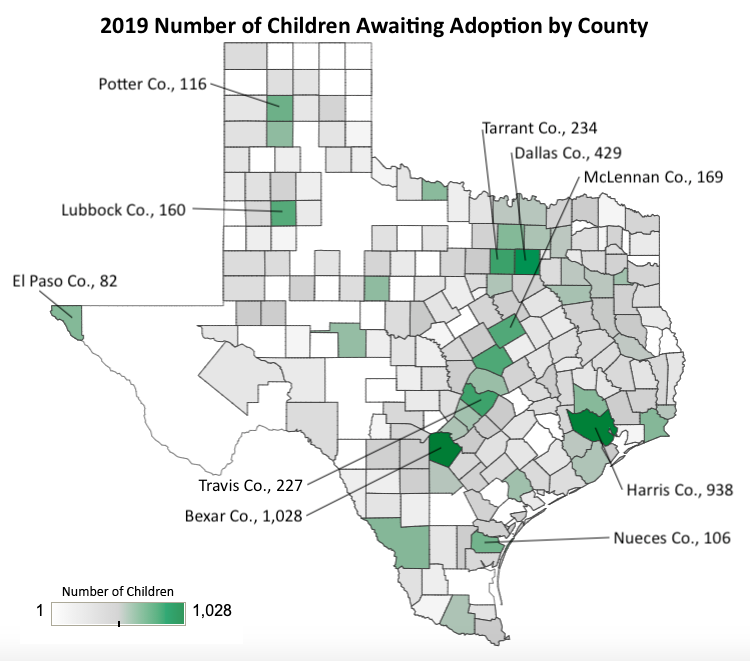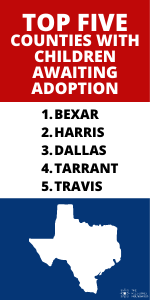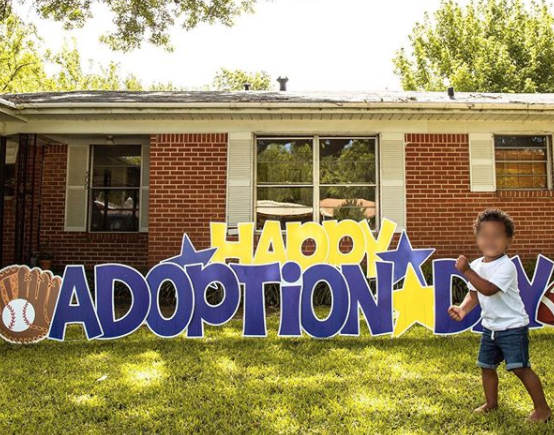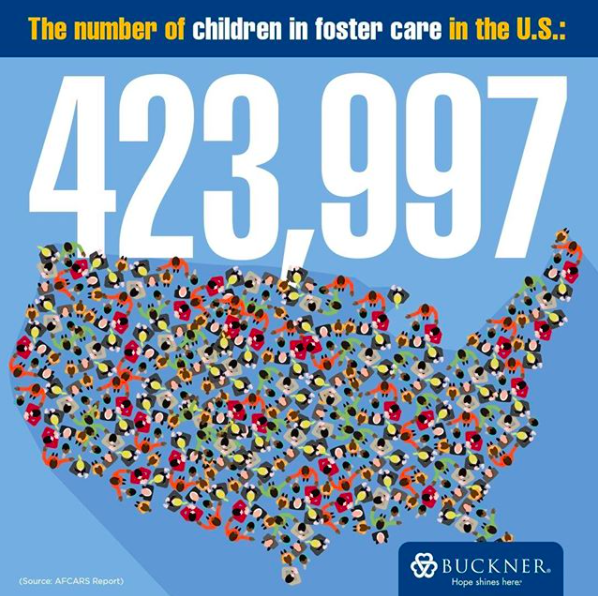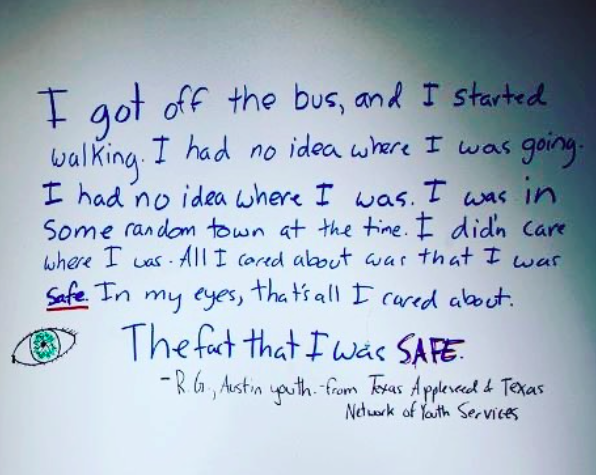January is Human Trafficking Prevention Month: Part 2 By: Justice Venture International [As we start the new…
National Adoption Day – November 21
North Texas Nonprofits Building Forever Families
National Adoption Day is observed each year on the Saturday before Thanksgiving. The day focuses on raising awareness of children in foster care waiting to be adopted. According to the Texas Department of Family and Protective Services, there are over 27,300 children in foster and substitute care as of August of 2020, and in 2019 there were approximately 6,806 children in need of a forever family.
The Rees-Jones Foundation is particularly impassioned by these children in state conservatorship, which is why the Foundation focuses significant resources each year to child welfare initiatives in North Texas.
“While some may say it takes a village to raise a child, the center of a child’s universe is family, not village. Family is the single most important influence in a child’s life. And when families thrive, it is family that protects them and best provides for their needs,” said Terese Stevenson, Vice President of Grants at The Rees-Jones Foundation. “For children who have entered the child welfare system, and are unable to be reunited with their biological parents, adoption to a forever family is intended to provide that important sense of security and stability, and most importantly, a sense of belonging in a family. The Rees-Jones Foundation works to support a continuum of services for children suffering from abuse and neglect, but ultimately, that aim is for all children to experience the love and stability of a forever family home.”
Nonprofit organizations and county courts across the country culminate adoption efforts throughout the month of November, which serves as Adoption Awareness Month.
To shorten the wait to be adopted that many children experience, DFPS launched the “Why Not Me?” public awareness campaign. According to DFPS, “More than 6,000 of abused and neglected children in Texas are awaiting adoption and about 60 percent of them are age 6 or older. The older the child, the longer they tend to wait for adoption.”
The “Why Not Me?” campaign website provides Texans with information about becoming an adoptive parent, and stresses the point that “whether they are 7 or 17, children never outgrow the need for parents”.
Through partnerships with the state, nonprofit organizations are able to serve vulnerable families and the children entering the child welfare system at the local level. Permanency is the ultimate goal, and permanency looks different in each case.
Child welfare agencies use a variety of strategies to achieve permanency for children. Permanency planning involves decisive, time-limited, and goal-oriented activities to maintain children within their families of origin or place them with other permanent families. One form of permanency is adoption. In cases where parental rights are terminated, permanent managing conservatorship is granted to the state, and the child is eligible for adoption by qualified families.
There are a number of nonprofit organizations in North Texas that serve the percent of children and youth who enter the foster care system and are in need of a loving, forever home.
Hope Cottage
The mission of Hope Cottage is to nurture and build families through education, counseling and adoption services.
Hope Cottage Pregnancy and Adoption Center provides resources and counseling to pregnant women, connects families looking to adopt with children who need a loving family, and offers life-long, post adoption services to its clients including counseling, reunions, record requests.
Hope Cottage is a placing agency, which means that it has a contract with the State of Texas to license foster families. The families that Hope Cottage works with are considered “foster-to-adopt” families, which means that the family has expressed the intention to adopt the child they are fostering if it’s a good match.
Hope Cottage is also licensed by the state to provide post-adoption services. While adoption does provide a child with a permanent, stable home, adoption does not absolve a child from past trauma. Adoption can be complicated for a child who oftentimes will grapple with feelings of abandonment by his or her birth parents, a sense of not belonging in an established family, or the manifestation of mental and behavioral conditions from the abuse or neglect that he or she endured prior to removal. This is why Hope Cottage provides post-adoption services to children and families for life.
Buckner Children and Family Services
The mission of Buckner is to protect children, promote independence, and build strong families through Christ-centered values.
Buckner Children and Family Services is celebrating 140 years of service in Dallas. Dr. R. C. Buckner founded Buckner Orphans Home in 1879,
establishing the organization as the oldest children’s charity in Dallas. Over time, Buckner’s social and educational programs evolved to meet the changing needs of society and the whole family.
Today, Buckner Children and Family Services, Inc. (a subsidiary of Buckner International) has grown into a highly diversified agency providing social service programs and ministries to disadvantaged and displaced children and families in 13 Texas cities, and six countries around the world.
While family preservation is the ultimate goal when a child enters care, the next best situation is adoption by a child’s relative. Buckner has a unique program, which seeks to leverage temporary kinship placements into permanent adoption. The program provides kinship caregivers with training about trauma, and encourages caregivers to provide social and emotional support and encouragement around the child’s educational needs and achievement. Additionally, the program seeks to develop the caregivers’ protective factors for the child, including parental resilience, social connections, and knowledge of parenting and child development. By laying this groundwork, the newly formed family is better prepared to take the next step to adoption.
Dallas CASA
The mission of Dallas CASA is to advocate in the community and the courtroom for children in the protective care of the state so they can grow up in safe, permanent homes where they can thrive.
For more than 40 years Dallas CASA has served the most vulnerable children in the community – children whose abuse is so severe they are removed from unsafe homes.
CASA was founded in 1977, when a Seattle superior court judge, amidst an overwhelmed child welfare system, grew concerned about making decisions in his court without enough information on behalf of the children who experienced abuse and neglect. He felt that more individualized attention and time for gathering important facts would produce better outcomes for the children. He decided to appoint community volunteers to work on behalf of the children in his court.
Judges appoint Dallas CASA volunteers to advocate for the best interests of children who have experienced abuse or neglect, helping these children gain safe, permanent homes as quickly as possible. While CASA’s role is not to facilitate adoption, it is the goal of a CASA to help a child achieve permanency, and oftentimes, this means being a resource for the child and foster family.
The decision to start a family is deeply personal, and factors such as financial ability and access to childcare usually play a large role in the decision-making process. The same is true for those faced with the decision to move from temporarily fostering to permanently adopting a child who has been taken into state custody. CASAs are uniquely poised to connect these families with resources such as free or reduced-cost childcare, therapy, food, diapers, or other services that might make the decision to adopt much easier.
A Collaborative Effort
While family is the north star goal for children in the child welfare system, it takes a village effort to ensure that children and caregivers receive the resources they need to support adoption. Through the collaborative efforts of agencies that provide these services, there is a massive effort in Texas to provide a continuum of care that, for many deserving children, will lead to adoption.
By supporting nonprofits like Hope Cottage, Buckner, and Dallas CASA, the Foundation attempts to keep pace with the overwhelming needs of vulnerable children at risk of abuse and neglect. The adoption process is not for the faint of heart, but for those who so desire to give their love and open their home to a child in need, there are scores of nonprofits in North Texas poised to help at all stages.
Share this post:
Category: Original Content
January is Human Trafficking Prevention Month: Part 1 By Shellie Velasco, Program Officer [As we start the…
Welcome to 2025 By Adrian Cook, Director of Research & Evaluation “But the steadfast love of the…

